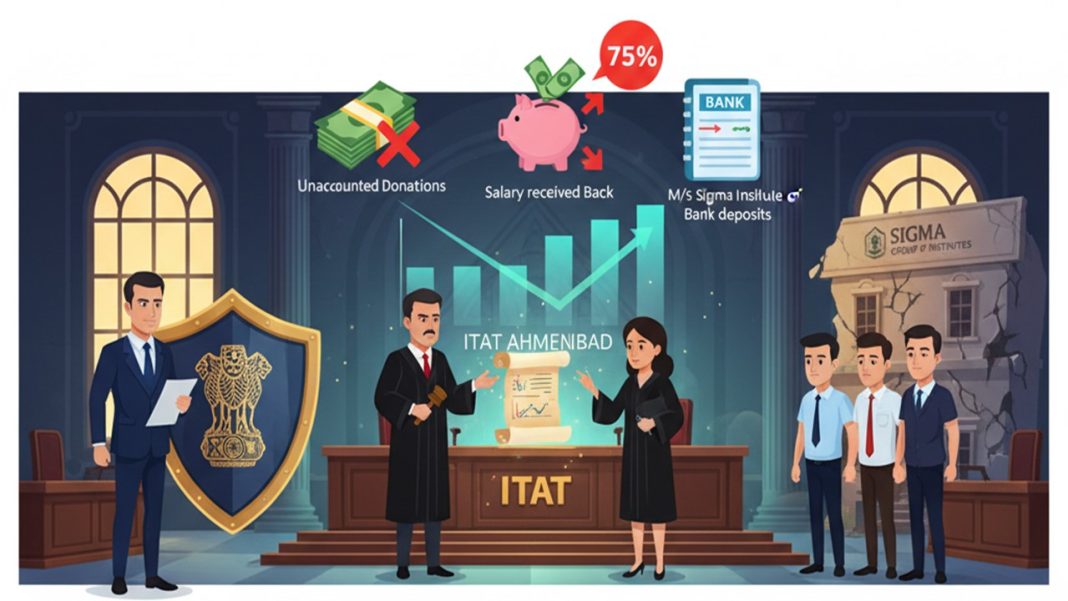ITAT Ahmedabad Partly Upholds Revenue’s Appeal; Extrapolation of Unaccounted Income Found Justified
The present appeal has been filed by the Deputy Commissioner of Income-tax (Appellant) in the Income Tax Appellate Tribunal (ITAT) “B” Bench, Ahmedabad, before Shri Sanjay Garg (Judicial Member) and Smt Annapurna Gupta (Accountant Member), against M/s Sigma Institute of Technology and Engineering (Respondent). The appeal is related to the assessment year 2008-09. The case was heard on August 07, 2025, and was decided on October 30, 2025. The appeal had been filed to challenge an order dated 12.12.2019 issued by the Learned. Commissioner of Income Tax (Appeals)-12, Ahmedabad, under Section 250 of the Income Tax Act, 1961.
The Income Tax Department searched on November 12, 2014, under Section 132 of the Income Tax Act on the Sigma Group of Institutes. During the search operation, the department found some incriminating documents regarding unaccounted donations received by the trust, salary paid back and various undisclosed bank accounts in the name of the assessee trust/institutions. Considering this, the assessing officer again reopened the case by issuing a notice under Section 148 of the Act. The appellant then filed his income tax return (ITR), declaring zero taxable income. But the AO examined all the seized evidence and decided to make additions under three heads:
- Unaccounted donations (money collected from students for admission, not shown in books).
- Salary received back (part of the salary paid to staff was taken back in cash).
- Unaccounted deposits in undisclosed bank accounts.
The assessing officer claimed that the trust registration was already cancelled on November 05, 2015, so the exemption under charitable status was not available. He then added up all these amounts and calculated the total taxable income at Rs. 23,177,093.
The trust then first appealed before the Commissioner of Income Tax (Appeals) [CIT(A)], who concluded to reduce the additions made by the assessing officer. The CIT(A) said the AO wrongly used “extrapolation”, meaning he estimated extra income for all students or employees based only on a few examples found in the search.
The respondent, dissatisfied with the ruling of CIT(A), then approached the ITAT Ahmedabad. The tribunal then made the following analyses:
- The tribunal said, as per the rulings of the Supreme Court and High Court, that “Extrapolation” is allowed only when the evidence shows a recurring and systematic pattern of hidden income. It cannot be used if the evidence shows just isolated cases or guesswork. For this point, the tribunal cited a key case titled CST vs. H. M. Esufali H. M. Abdulali (90 ITR 271, SC), where the Supreme Court held that estimation is valid if based on a reasonable and logical basis, not on mere suspicion.
- When the tribunal analysed all the material found during the search, it concluded that all this evidence proved a clear and continuous system of collecting donations from students who got seats under the management quota. The Tribunal said this was not an isolated case but a regular method (modus operandi). Hence, extrapolation by the AO was justified, i.e., it was correct to assume donations were taken from most management-quota students. However, they also said it is possible that some students got admission without paying donations. So, to be fair, the Tribunal decided extrapolation should apply to only 75% of the management quota students, not all.
- Thereafter, the tribunal talked about the “Salary Received Back in Cash”. The tribunal said that there was clear evidence of a regular practice, not an occasional act. Hence, extrapolation (estimation) for the whole year was fully justified, and the CIT(A) was wrong to reduce it. Therefore, the Tribunal allowed the Revenue’s appeal on this issue, meaning the AO’s full addition on this point was restored.
- Then, the tribunal talked about the “Unaccounted Bank Deposits”. After the decision announced by CIT(A), it was concluded that:
- Two accounts belonged to other entities (Shah Associates and Shree Takshila Foundation), which were separately assessed and had recorded these transactions in their books. Some deposits were actually cash re-deposited from withdrawals or transfers between accounts (not fresh income).
- The ITAT noted that the Revenue could not disprove these factual findings of the CIT(A). So, the Tribunal confirmed the CIT(A)’s decision on this issue; the reduced addition remained.
- Therefore, in the final decision, the tribunal, on the grounds of 1-4, ruled in favour of the income tax department, i.e., AO’s additions were restored, with a 75% limit on donation extrapolation. Dismissed the ruling made by CIT(A). Meaning, the income tax department’s appeal has been partially allowed.
Citation: Deputy Commissioner of Income-tax Vs M/s. Sigma Institute of Technology and Engineering (ITAT Ahmedabad); I.T.A. No. 197/Ahd/2020; 30/10/2025; 2008-09
Refer to the official judgement for complete information.



